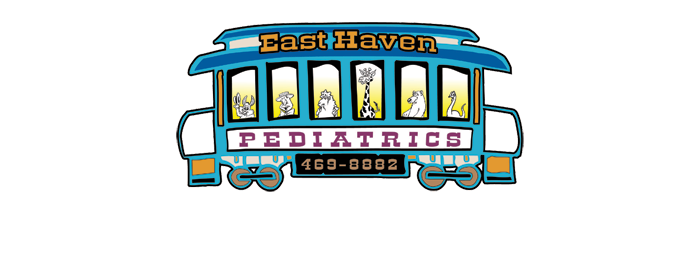
Resources
Newborn Care

Do You Have a New Bundle of Joy?
 Congratulations on the arrival of your new baby! Caring for your young infant is a full time responsibility and is very rewarding. Many parents experience the mixed emotions of both excitement and intimidation when caring for a baby. It's a wonderful experience getting to know your new child. You might have questions and worries about newborn care, which is why the medical team at East Haven Pediatrics want to help guide you in your journey.
Congratulations on the arrival of your new baby! Caring for your young infant is a full time responsibility and is very rewarding. Many parents experience the mixed emotions of both excitement and intimidation when caring for a baby. It's a wonderful experience getting to know your new child. You might have questions and worries about newborn care, which is why the medical team at East Haven Pediatrics want to help guide you in your journey.
What to Know About Your Newborn
Patience, common sense and a little humor will help you through the occasional rough patches (and lack of sleep!) as you transition into parenthood. We are here to help guide you along with any questions you might have. Your regularly scheduled well baby check-ups are a great way to help you through the first weeks and months, as we track your infant's growth and development and offer advice and assistance with any concerns or uncertainties you may have. The more informed and prepared you are, the better parent you can be.
Advice For the First Weeks With Your Infant
Feedings
If you are breast-feeding, we suggest a feeding schedule of approximately every 2 - 4 hours. Every baby is different, so learning to read the signs your child is giving will help you to determine what is best. On the first day, let the baby nurse for 5 minutes on each breast. Each day, you can increase for 1 - 2 minutes on each side until nursing is well-established. Sometimes newborns need a lot of practice, and the more they feed the more milk mom will produce for them. It often takes between 3 - 6 days after delivery for your regular breast milk to come in. Some babies feed even more frequently during this time, and that's normal.
The American Academy of Pediatrics and the World Health Organization recommend breastfeeding for 6 - 12 months. We wholeheartedly support this recommendation but realize that this is not possible for every family. The more informed you are as a parent, the better decisions you can make for the health of you and your child.
For mothers who are feeding with formula, we recommend a schedule of every 2 - 4 hours. By the time an infant is about two weeks old, he or she will likely be drinking 1 - 3 ounces per feeding. Be sure to thoroughly wash the bottles and nipples with hot, soapy water and rinse well. We always advise parents not to heat bottles in a microwave because of uneven heating. This can cause hot spots in the milk which could burn the baby's mouth.
Jaundice
Jaundice common in newborns. It is a yellow discoloration of the skin and eyes that appears in many babies during the first few days after birth. It will often go away on its own but can also be treated with light therapy if your pediatrician recommends it. If you notice this yellow color increase over time or extend beyond the face to the belly or diaper area, please call your pediatrician and let them know.
Urine & Stool
Your infant should be urinating several times each day. Urination should be effortless. After the first several days, your baby should urinate every 4 hours. Each child is different, so pay attention to your baby's urine output for the first few weeks.
Breast-fed infants usually have frequent, loose, yellow-green "seedy" stool, often after each nursing. Formula-fed infants may also have loose, yellow-green movements, but their stools tend to be a little firmer than those of breast-fed infants. Don't be alarmed if your baby does not have a bowel movement after each feeding - every child is different. Some babies will go for a few days without having a bowel movement and others will have a bowel movement after each feeding. Pay attention to your baby and get to know what their "normal" movements are.
Cord Care and Bathing
Your baby's umbilical cord will dry up and fall off naturally between 1 - 3 weeks after birth. Don't be alarmed if you notice small amounts of blood around the umbilical cord. This is normal. However, if there is a large amount of blood oozing from the cord or if it persists, you should call your pediatrician. You can give your infant regular baths before the umbilical cord falls off. You can bathe your baby 2 - 3 times a week or as necessary. Infants' skin will naturally crack and peel a bit as they grow during the first several weeks. Most infants will develop temporary rashes somewhere on their face or body during the first few months. These will improve and disappear when left alone. If your baby has a rash that appears persistent over a long time or worsens, contact your pediatrician.
Health and Safety Tips
We always recommend that healthy, full term babies sleep on their backs.
When traveling in a car, the baby must be securely strapped into an appropriately sized infant seat in the back seat of the car. Infants should be rear-facing until 24 months of age, regardless of weight.
A smoke alarm in the baby’s room is an excellent idea and you should inquire about a “tot finder” sticker for the window.
Do not put any jewelry or other items around the baby’s neck.
Do not leave an infant unattended with a family dog or cat in the room, and closely supervise toddlers around your newborn baby.
Do not feed an infant honey or corn syrup, or use them to sweeten food or water. Infant botulism, a neurological disease, has been associated with the use of honey and corn syrup in infants under one year of age.
Do not give your baby any medicines or over-the-counter vitamins or any other products unless you have a specific recommendation from us.
Contact Your Pediatrician if:
- Your baby has a rectal fever of 100.4 degrees or greater
- Your baby has consistent poor feeding, refusing the bottle or breast
- Your baby has inconsistent urine output
- There is blood in a stool
- Your baby has projectile vomiting
- Your baby is inconsolable and cannot be calmed for more than 3–4 hours
Please call our team at East Haven Pediatrics today at 203-469-8882 if you have any questions or concerns at all about your child. We are here to help!


